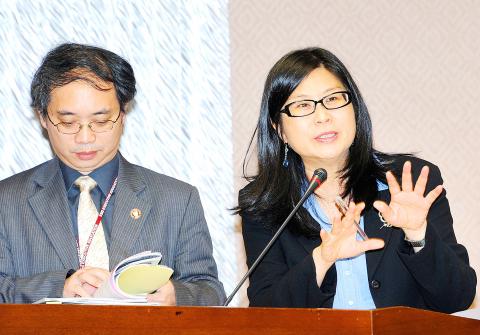Growing Chinese influence on the Taiwanese media, in particular via embedded marketing, is a concern and the government has not done enough to address the matter, Democratic Progressive Party lawmakers said in the legislature yesterday.
At the meeting of the legislature’s Internal Administration Committee, lawmakers accused Mainland Affairs Council (MAC) Minister Lai Shin-yuan (賴幸媛) of doing nothing about embedded marketing by China’s Fujian Provincial Government in local newspapers.
The Chinese-language China Times, a subsidiary of Want Want Group, was reportedly paid to cover Fujian Province Governor Su Shulin’s (蘇樹林) visit to Taiwan last month.

Photo: Fang Pin-chao, Taipei Times
Taiwanese law prohibits Chinese advertising in the media and Chinese investment in local media.
In the question-and-answer session, Lai said an investigation had shown there was “clear evidence” that the newspaper was involved in illegal advertising.
However, the Ministry of Economic Affairs is the agency with the authority over the violations, because Su was invited by the Chinese National Federation of Industries and the ministry has demanded an explanation from the newspaper, she said.
Lai said there was no law in -Taiwan regulating the content of print media because the Publication Act was abolished in 1999, leaving only self-regulation by the media because the Taiwanese government respects freedom of speech and freedom of the press.
DPP Legislator Chen Chi-mai (陳其邁) also cited media reports claiming that state-funded Central News Agency (CNA) had published travel information about Fujian Province on its Web site, which Lai confirmed was against the law.
Lai said Taiwanese media were barred from publishing advertisements provided by unauthorized Chinese advertisers.
Such violations could be traced as far back as 2008, DPP -Legislator Yu Mei-nu (尤美女) said, -adding that the Control Yuan had said in a report that the China Times and the Chinese-language United Daily News were both involved in similar violations in their news coverage on China’s Hunan Province in 2010.
DPP Legislator Chen Ou-po (陳歐珀) said officials from the Taiwan Affairs Office were also suspected of paying personnel in Taiwanese media, citing the case of Feng Fu-hua (馮復華), daughter of former New party legislator Feng Hu-hsiang (馮滬祥).
There has been no coordination among government agencies on the issue, lawmakers said, with the MAC saying it has neither the power to regulate the media nor to determine if visiting Chinese officials violate laws, such as promoting investment in China.
In Su’s case, the ministry was the responsible agency, while in the case of Association for Relations Across the Taiwan Straits (ARATS) Deputy Chairman Zheng Lizhong (鄭立中), who visited southern Taiwan for two weeks in February, the responsible agency was the Council of Agriculture, Lai said.
DPP lawmakers accused the MAC of shirking its responsibilities as the main China policymaking agency over its inability to tackle the issue.
The committee reached a resolution that demanded the MAC coordinate an inter-agency investigation on the matter and levy punishment, if any violation is found, within a month.

Chinese Nationalist Party (KMT) Chairman Eric Chu (朱立倫), spokeswoman Yang Chih-yu (楊智伃) and Legislator Hsieh Lung-chieh (謝龍介) would be summoned by police for questioning for leading an illegal assembly on Thursday evening last week, Minister of the Interior Liu Shyh-fang (劉世芳) said today. The three KMT officials led an assembly outside the Taipei City Prosecutors’ Office, a restricted area where public assembly is not allowed, protesting the questioning of several KMT staff and searches of KMT headquarters and offices in a recall petition forgery case. Chu, Yang and Hsieh are all suspected of contravening the Assembly and Parade Act (集會遊行法) by holding

PRAISE: Japanese visitor Takashi Kubota said the Taiwanese temple architecture images showcased in the AI Art Gallery were the most impressive displays he saw Taiwan does not have an official pavilion at the World Expo in Osaka, Japan, because of its diplomatic predicament, but the government-backed Tech World pavilion is drawing interest with its unique recreations of works by Taiwanese artists. The pavilion features an artificial intelligence (AI)-based art gallery showcasing works of famous Taiwanese artists from the Japanese colonial period using innovative technologies. Among its main simulated displays are Eastern gouache paintings by Chen Chin (陳進), Lin Yu-shan (林玉山) and Kuo Hsueh-hu (郭雪湖), who were the three young Taiwanese painters selected for the East Asian Painting exhibition in 1927. Gouache is a water-based

Taiwan would welcome the return of Honduras as a diplomatic ally if its next president decides to make such a move, Minister of Foreign Affairs Lin Chia-lung (林佳龍) said yesterday. “Of course, we would welcome Honduras if they want to restore diplomatic ties with Taiwan after their elections,” Lin said at a meeting of the legislature’s Foreign Affairs and National Defense Committee, when asked to comment on statements made by two of the three Honduran presidential candidates during the presidential campaign in the Central American country. Taiwan is paying close attention to the region as a whole in the wake of a

OFF-TARGET: More than 30,000 participants were expected to take part in the Games next month, but only 6,550 foreign and 19,400 Taiwanese athletes have registered Taipei city councilors yesterday blasted the organizers of next month’s World Masters Games over sudden timetable and venue changes, which they said have caused thousands of participants to back out of the international sporting event, among other organizational issues. They also cited visa delays and political interference by China as reasons many foreign athletes are requesting refunds for the event, to be held from May 17 to 30. Jointly organized by the Taipei and New Taipei City governments, the games have been rocked by numerous controversies since preparations began in 2020. Taipei City Councilor Lin Yen-feng (林延鳳) said yesterday that new measures by